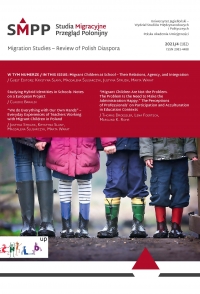Social Capital and Agency in the Peer Socialization Strategies of Migrant Children in Poland
Social Capital and Agency in the Peer Socialization Strategies of Migrant Children in Poland
Author(s): ANZHELA POPYKSubject(s): Social Sciences, Sociology, Migration Studies
Published by: Wydawnictwo Uniwersytetu Jagiellońskiego
Keywords: peers; socialization; transnational transitions; migrant children; social capital
Summary/Abstract: The transnational transitions of migrant children are complex, mobility-affected processes during which they mediate between various social fields. Their attachment to these fields is often determined by different socialization agents, among which great attention should be paid to peers and friends. Peers not only introduce a new culture and society to migrant children but also affect the young migrants’ motivation, formation of identity, and group socialization. This study adopts the theory of social capital and agency, defined by Putnam, to explore migrant children’s peer socialization strategies. It draws on qualitative research with migrant children in Poland aged 8–13, their parents, and their teachers, and is based on a child-centered approach. The findings present three main ways in which migrant children exercise their own agency to build social capital by maintaining ethnic/non-ethnic ties in the receiving country. The age, gender, and ethnic differences that appear in the application of peer socialization strategies are also revealed.
Journal: Studia Migracyjne - Przegląd Polonijny
- Issue Year: 2021
- Issue No: 4
- Page Range: 117-137
- Page Count: 21
- Language: English

